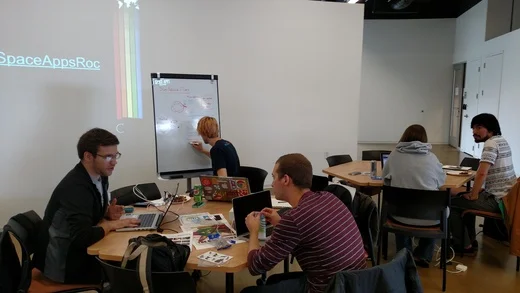[ad_1]
This year, Rochester Institute of Technology (RIT) was selected as a host location for the NASA Space Apps Challenge, an annual event where NASA gives a series of prompts and challenges for programmers around the world to complete. Using multiple sets of existing open data, attendees are provided the resources to develop creative and imaginative solutions to complex issues.
Over fifty students, teachers, and space lovers gathered at the RIT Center for Media, Arts, Games, Interaction, and Creativity (MAGIC) to work on projects April 23-24. The challenges were diverse, with topics ranging from the International Space Station to the solar system and even journeying to Mars. The full list of challenges is on the Space Apps website.

The speakers
On Saturday, local librarian Pat Rapp gave a talk titled Hackers in the dust. Her talk was about Burning Man, an annual celebration of creativity and innovation in the Black Rock Desert in Nevada. For a week, makers, artists, and inventors from around the world gather in the desert to showcase their creations. Rapp detailed her experience working on a moon rover replica with her team and explained how Burning Man’s unique culture is applied to technology and innovation for space exploration at NASA.
Sunday’s guest speakers were researchers Hans-Peter Bischof and James Healy from the RIT Center for Computational Relativity and Gravitation. Their talk, Simulating and discovering gravity waves, focused on the recent discovery of gravitational waves.
The projects
Four Rochester teams submitted projects for the Space Apps Challenge, and each one attempted to accomplish a unique task. In the spirit of the open data provided to the hackers, all of the projects were released as open source or used open hardware:
- MarsSat simulates controlling a satellite as it orbits and takes pictures around Mars. The pictures are used to help imaginary Mars colonists complete missions.
- Find the Moon is a game that helps teach children the different phases and cycles of the moon based on the time of day and month.
- Lucifer’s Screwdriver uses machine learning to identify potentially hazardous asteroids and their probability of hitting Earth.
- The Enterprise Bridge Simulator aims to bring users aboard the iconic Star Trek ship.
MarsSat and Lucifer’s Screwdriver were selected as the event winners and are going on to compete at the national level.
Special thanks
This event was proposed and organized by researchers and faculty from FOSS@MAGIC, an RIT initiative that aims to teach free and open source software to students and help develop and support FOSS efforts at the university. The initiative is active and engaged with the open source community at large and helps bring events like the NASA Space Apps Challenge to campus while supporting local efforts in the Rochester area.
Special thanks goes to Stacey Brooks from NASA’s office in Washington, D.C. for visiting RIT during the event and checking out all of the projects. The next FOSS@MAGIC event will be on Software Freedom Day 2016.
[ad_2]
Source link